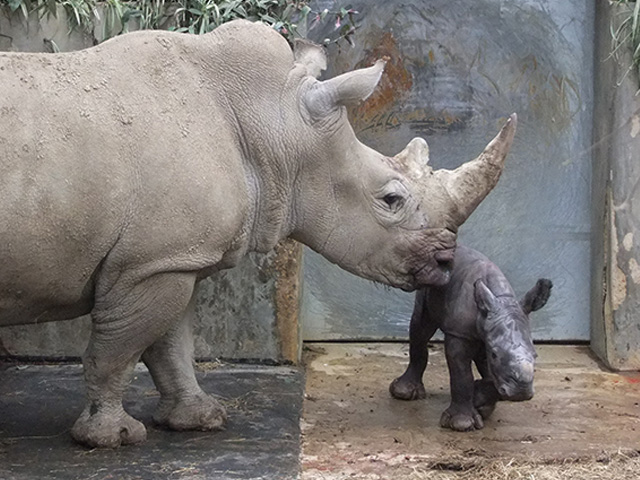Baby White Rhino birth caught on camera at Cotswold Wildlife Park.

Cotswold Wildlife Park celebrated two incredible milestones this week. First-time mother Ruby gave birth to the Park’s first male Rhino on the same day the Park celebrated its forty-fifth anniversary. The tiny calf is healthy and nursing well from Ruby, who is proving to be an exceptional mother.
Keepers and a few lucky visitors were present when Ruby gave birth at 12.30pm on Friday 27th March. In less than ten minutes, the fifteen month pregnancy was over and thankfully, after a relatively quick labour, a new baby was welcomed into the family-run Burford collection. Keeper Chris Kibbey caught the special moment on film and it can be seen below along with a photo gallery of his first day.
Curator of Cotswold Wildlife Park, Jamie Craig, commented: “Although we were expecting the birth, it still took us by surprise at the time – after careful preparations for a nice, quiet arrival, Ian was born in full view of many of the staff here at lunchtime on Friday and Ruby allowed us a full graphic view of his entry into the world – an experience we will never forget. Although still very early days, he seems strong and Ruby appears to be an attentive mother.”
The calf has been named Ian in memory of the highly respected South African conservationist, Ian Player, who spearheaded efforts to rescue the Southern White Rhino from extinction. The Park’s original Rhino pair, called Lebombo and Somtuli, arrived from Umfolozi in 1972 as a direct result of Ian’s Rhino conservation initiatives with South Africa’s Natal Parks Board. His memory lives on in the Park’s Rhino family.
Father Monty and Ruby are both nine years old. In 2009, Ruby (along with another female called Nancy) made the eleven thousand kilometre journey from Mafunyane Game Farm in South Africa to the UK to join young male Monty at their new Oxfordshire home. It was hoped that, one day, they would successfully produce the Park's first ever Rhino calf. Monty has since fathered two calves. Nancy gave birth to Astrid on 1st July 2013 and Ian followed twenty months later.
Females only reproduce every two-and-a-half to five years, so the window of opportunity for successful reproduction is limited. Unbelievably, these iconic animals were once the rarest subspecies of any Rhino and were on the verge of extinction in the early 1900s, when it was believed only twenty to fifty animals remained in their native African homeland. Thanks to excellent and sustained protection, they are now the most common of the five Rhino subspecies, although poaching in the last five years has once again escalated to serious levels, driven by demand for rhino horn from the traditional medicine market of China and the Far East.
Visitors can see the new calf daily from 10am to 6pm (last entry at 4.30pm) in the solar powered Rhino House.
Explore Gloucestershire
2 April 2015
For further information.
OTHER NEWS
